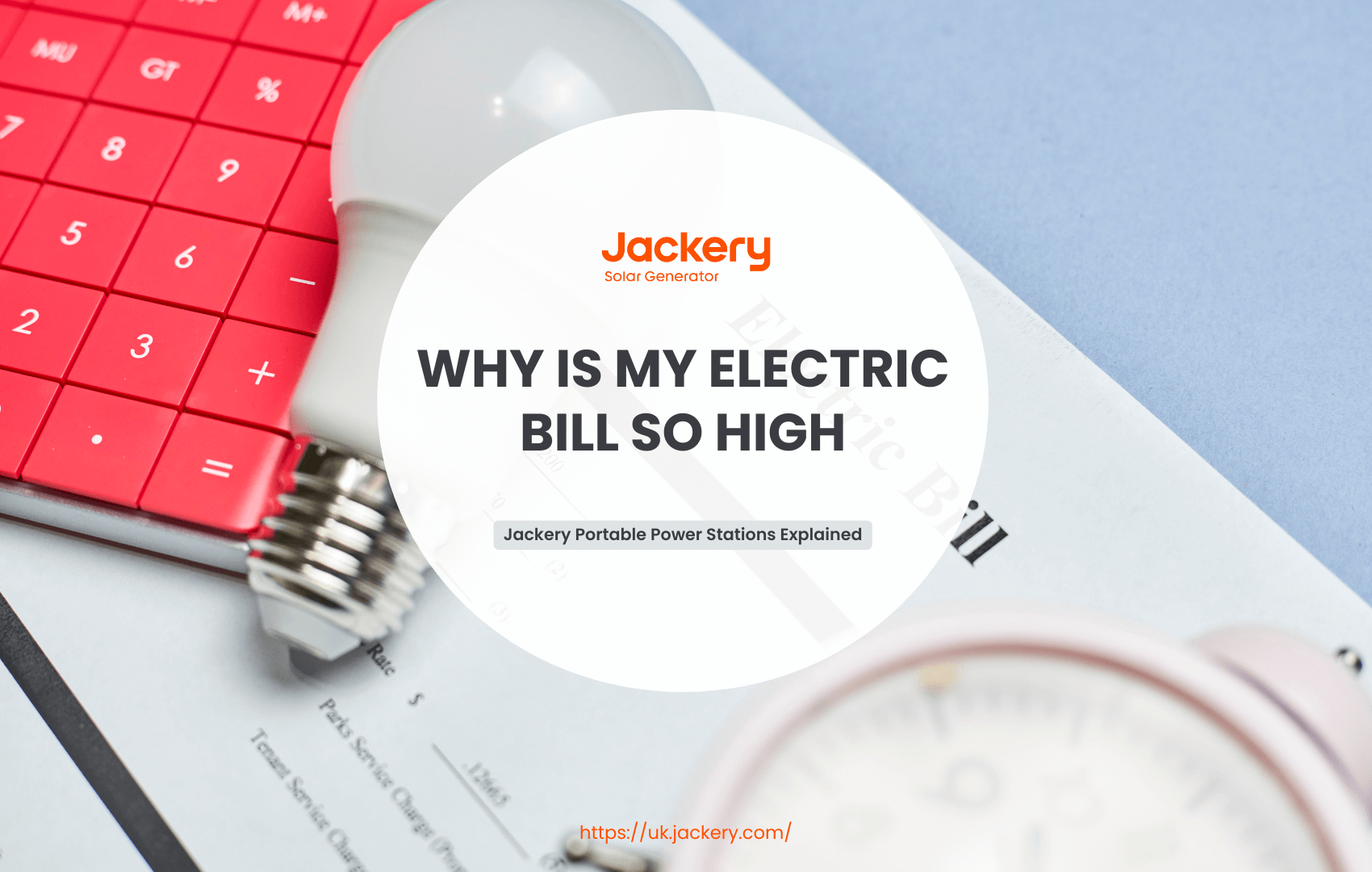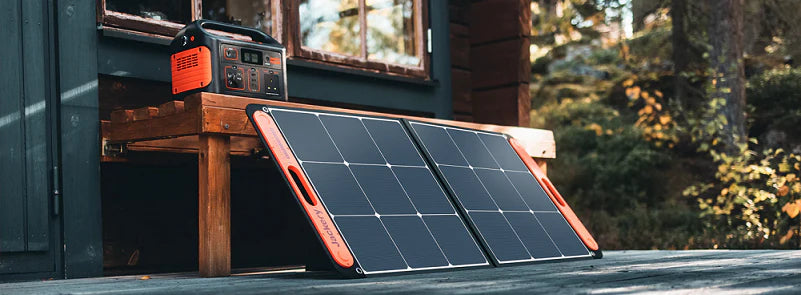Nothing is more unpleasant than opening your electric bill and discovering the charges are much higher than expected. Most people would probably say, "Why is my electric bill so high?" Don't worry; understanding why your electric bill is so high is the first step to lowering it completely. Once you know the reasons for your high electricity bills, you can curb them by changing how you use electricity or the energy source.
This guide will help you identify what caused your electric bill to soar and provide tips on lowering it. In addition, if you struggle to pay your high electric bill, you can find the answer through this blog. To save on your electric bill, we also highly recommend Jackery Portable Power Station, a portable power supply for powering your household appliances at home.
|
Key Takeaways: |
|
- You can see if your electricity bill is too high by comparing it to your average electricity consumption. - Frequent use of high-powered devices, poor home insulation, and electricity consumption concentrated during peak hours can all lead to high electricity bills. - Develop energy-saving habits, install a smart thermostat, use low electricity prices during off-peak hours, or switch to solar energy to reduce your electricity bill effectively. - If you are having trouble paying your high electricity bill, contact your supplier as soon as possible to negotiate a payment plan you can afford. - We recommend Jackery Explorer 2000 Plus and 3000 v2 to power your household appliances to lower your electric bills. |
How Can I Tell If My Electricity Bill Is High?
In the UK, electricity bills are essential to the household budget. You need to analyse and compare from multiple dimensions to know whether you are paying too much for electricity. To determine whether the electricity bill is too high, you can compare and analyse it in the following ways:
Compare the Average Electricity Bill
The electricity bill will indicate the price per kilowatt-hour (p/kWh) and the daily standing charge (which will be charged even if you don't use electricity). According to the energy price cap from April 1 to June 30, 2025, the current average electricity price in the UK is about 27.03 pence per kilowatt-hour. There may be abnormal costs if your unit electricity price is significantly higher than this benchmark.
In addition, you can compare your electricity bills with the averages of different house sizes in the UK published by Ofgem to see if yours is too high.
|
Electricity Usage |
Annual Electricity Bill (excluding standing charge) |
Monthly Electricity Bill (excluding standing charge) |
|
Low (flat or 1-bedroom house / 1-2 people) |
£486.54 |
£40.55 |
|
Medium (3-bedroom house / 2-3 people) |
£729.81 |
£60.82 |
|
High (5-bedroom house / 4-5 people) |
£1108.23 |
£92.35 |
(This table is based on the energy price cap from April 1 to June 30, 2025, for reference only.)
Based on the above data, if the monthly electricity bill for an average UK household (2-3 people) is much more than £60 (for example, £100), then it means that its electricity bill is too high.
Compare Average Electricity Consumption
In addition to electricity prices, you can also measure whether your electricity bill is too high by looking at the electricity consumption on your bill. If your electricity consumption is significantly higher than the average UK household's average (more than 50kWh per month), then your electricity bill will be high. Here are the average electricity consumption of different house sizes in the UK published by Ofgem:
|
Number of Bedrooms |
Electricity Usage (kWh) |
|
Low (flat or 1-bedroom house / 1-2 people) |
1,800 |
|
Medium (3-bedroom house / 2-3 people) |
2,700 |
|
High (5-bedroom house / 4-5 people) |
4,100 |
(This table data is for reference only; actual electricity consumption will be affected by many factors.)
In addition, you can check your recent electricity consumption and compare it with historical bills to see if it has suddenly increased. If your home has a smart meter (such as Economy 7), you can check whether the peak and valley electricity consumption ratio is reasonable through the bill details.
Use Price Comparison Tools
You can check whether your electricity bill is too high through price comparison websites. Enter your electricity usage and current rate to see if other suppliers or plans are cheaper. Suppose your electricity price is much higher than that of different suppliers or plans. In that case, your electricity bill will be higher if you consume the same amount.
Here are some of the most popular price comparison websites:
In short, the above methods can quickly determine whether your electricity bill is reasonable. You should check and compare your electricity bills regularly to avoid abnormal bills without knowing it.
Why Is My Electric Bill So High?
Most of us have wondered, “Why is my electricity bill so high?" If you can identify the reasons for your rising electricity bill, you can better address the problem and find ways to reduce it. There are many reasons for high electricity bills, from rising energy prices to inefficient appliances. Here are some of the most common reasons for spikes in electricity consumption.

International Energy Market Fluctuations
Fluctuations in fuel prices, either locally or globally, can affect the cost of electricity. When the cost of fuels used to generate electricity, such as gas, coal and oil, rises, these increases are usually passed on to consumers. For example, after 2022, tight gas supplies in Europe caused price spikes, directly pushing electricity prices. Wholesale electricity prices account for about 40%-50% of electricity bills. In 2023, wholesale electricity prices in the UK will still be 3-4 times higher than in 2020, which will be passed on to consumers.
Weather Changes
If your area experiences unusually hot or cold weather, the demand for heating or cooling will surge, increasing energy consumption and electricity bills.
For example, if your air conditioning system is too low during the summer heat, maintaining that temperature will take more energy than when it's cool outside. Similarly, with long, cold British winters, using electric heating (such as storage heaters) can double your electricity bill.
Failure to Replace Old Appliances
According to the Energy Saving Trust, all older appliances use more electricity than modern, more efficient models. Older appliances lose efficiency due to daily wear and tear, so they use more electricity as they are used. For example, an old fridge may cost more than £100 a year more in electricity bills than an energy-efficient model.
Frequent Use of High-Power Appliances
For example, water heaters use a lot of energy, and using them too often can significantly impact your electricity bill. If you set your water heater too high, you'll use too much electricity and pay too much for it. However, even if you don't use the hottest water, the water heater will work hard to maintain the temperature in the cavity and use a lot of electricity.
Poor Insulation in Your Home
Poor insulation in your attic or the gaps between doors and windows can overload your heating and cooling systems, causing air to leak faster. This inefficient insulation can increase your electricity bill by increasing power consumption.
According to the UK government, about 40% of homes have insulation levels below Class C (EPC rating), which means that these homes need to consume more electricity to keep heating or cooling running properly.
Concentration of Power Consumption at Peak Times
Using high-energy appliances during peak times (when demand is highest) can result in higher electricity bills if you are on a time-of-use electricity plan. When your family starts working from home, people are using electricity during peak times during the day, and this change can cause your electricity bill to soar. For example, if you are on a TOU plan, using electricity during peak times between 3 p.m. and 7 p.m. on weekdays can cause a sudden increase in your electricity bill.
More Residents
More people in your home can lead to higher electricity consumption because more electricity is needed to light, heat, cool and power appliances. Similarly, if you add space to your home or move to a larger house, your electricity needs will naturally increase, causing your electricity bill to rise.
Faulty Meter
It's not common for a bad meter to cause an increase in your electricity bill, but it does happen. You can usually tell if the meter is faulty by turning off all the circuits in the fuse box and monitoring the bill. If the meter still shows that it consumes electricity after the main power is turned off, it has a problem. In addition, you can hire a professional electrician to help confirm whether the meter is broken and the bill is rising.
Estimated Bills
If you often neglect to provide your energy supplier with meter readings, your energy supplier will issue you an estimated bill. Estimated bills are likely to be higher than your actual electricity usage because it is an estimated electricity usage based on the size of your home and previous electricity usage. Therefore, the electricity bill on the estimated bill will also be higher than usual.
How to Reduce My Electricity Bill?
Do you get shocked when you look at your electricity bill every month? Don't be discouraged; you can take steps to reduce your electricity usage and bills. In the UK, lowering your electricity bill can be achieved in various ways, including optimising energy use, choosing cheaper suppliers and using sustainable energy. Here are some practical tips to help UK residents save money on their electricity bills:

Develop Energy-Saving Habits
Developing energy-saving habits is a simple way to reduce your electricity usage. Here are some energy-saving habits that can significantly reduce your electricity usage over time:
Turn off the lights when you leave a room.
Try to use natural light during the day.
Wash clothes with cold water.
Unplug unused chargers and TV standby sockets.
Use smart sockets to monitor and automatically turn off non-essential devices.
Change Energy Suppliers or Tariffs
Comparing different energy suppliers or tariffs can help you find a more affordable option. Changing suppliers may give you a lower rate and a better plan that suits your energy needs. For example, fixed-rate plans provide stability by locking in a fixed electricity rate, protecting you from seasonal price fluctuations and sudden price increases.
Replace Old Appliances
If your home's appliances and equipment are nearing the end of their lifespan, replace them now to reduce electricity consumption. Refrigerators, freezers, and dryers use the most energy, so prioritise these and install new appliances that meet the ENERGY STAR rating. In addition, you can replace traditional water heaters that use a lot of electricity with more efficient tankless water heaters or heat pumps.
Take Advantage of Low Off-Peak Electricity Prices
If you have a time-of-use (TOU) plan, you can reduce your monthly electricity bill by adjusting the times you use electricity. Once you know when electricity is most expensive, you can plan your electricity use accordingly.
For example, run your clothes dryer or charge your electric vehicle (EV) in the evening or early morning. In addition, you can fully charge a portable power station (such as the Jackery Explorer 2000 Plus / 3000 v2) during off-peak hours to use during peak hours.
Consider a Professional Energy Audit
Hiring a professional can make specific recommendations and improvements for upgrading appliances, light bulbs, home systems, doors and windows, and more. For example, a professional energy auditor can identify spaces that need insulation replaced to improve comfort and reduce energy consumption.
Go Solar
Solar power can be an alternative to the grid if you don't want to change your energy habits or modify or update your home or appliances. Instead of relying on the grid for power, consider capturing the sun to keep your energy flowing. Although installing a solar system requires a significant upfront cost, most solar systems pay for themselves. Some UK residents who install solar systems can even get a partial payback through SEG.
Install a Smart Meter
Smart meters automatically send meter readings directly to your supplier to prevent you from forgetting to provide meter readings and using inaccurate estimated electricity bills. In addition, smart meters monitor electricity usage in real-time and provide accurate electricity usage. Smart meters are free, and you can apply for them from your energy supplier.

Jackery Portable Power Stations for Lowering Electric Bills
Many utility companies have time-of-use (TOU) rates, where electricity costs more during peak demand hours (typically weekday evenings). Suppose you charge your Jackery Portable Power Station using Jackery Solar Panels during the day (when sunlight is abundant and often during off-peak hours). In that case, you can then use this stored energy to power your devices and appliances during the expensive peak hours. This reduces your consumption of electricity from the grid during these high-cost times.
You could charge your Jackery with solar energy during the day and then use it to power your TV and lights or charge your laptops and phones in the evening when electricity rates are higher.
In situations like camping, outdoor events, or during power outages, using a Jackery powered by solar can offset the need to use grid electricity for specific devices. While these might be temporary uses, they contribute to a lower overall consumption from the utility grid.
Jackery Explorer 3000 v2
The Jackery Explorer 3000 v2 Portable Power Station and SolarSaga 200W Solar Panels work together to create a strong and movable energy source. Its long-lasting 3072Wh LFP battery is the smallest and lightest 3kWh LFP solar generator on the market.

The Jackery Explorer 3000 v2 is a robust portable power station boasting a substantial 3072Wh LiFePO4 battery with an impressive lifespan of over 4000 cycles. It delivers a powerful 3600W continuous AC output (7200W peak) through four standard outlets and a TT-30 outlet alongside USB-C (100W PD), USB-A (QC 3.0), and a carport for versatile charging. Its fast recharging capabilities include up to 1800W AC input for a full charge in under 3.5 hours and up to 1000W solar input.
Designed for reliability and convenience, the 3000 v2 features UPS functionality with a quick switchover time, a comprehensive Battery Management System for safety, and a relatively portable design despite its capacity. While it doesn't support battery expansion, its significant power and diverse port selection make it an excellent choice for a greenhouse and powering demanding appliances outdoors.
Furthermore, despite its considerable capacity, the 3000 V2 prioritises user convenience with its sturdy handles for easier lifting and transportation. While not always explicitly stated as a standard feature across all retailers, some versions or bundles include protective accessories like dust covers or carrying bags. Its silent operation (below 27 dB) is a significant advantage over traditional generators, making it suitable for indoor and noise-sensitive environments.
Jackery Explorer 2000 Plus
Jackery has unveiled the Explorer 2000 Plus, a cutting-edge portable power solution with exceptional performance for greenhouses. Thanks to its substantial capacity and formidable power output, this device can sustain the operation of standard outdoor appliances for several weeks and fulfil all the power needs associated with greenhouses.

(*The working hours are only for reference; the actual working hours depend on your usage.)
The Jackery Explorer 2000 Plus allows adding extra battery packs, which boosts the capacity from 2 kWh to a remarkable 12 kWh, thus significantly enhancing the solar charging capabilities. With the ability to be expanded to 3000W, this solar product offers a 30% higher rated power than other 2 kWh solar goods available in the market.
The Explorer 2000 Plus is an industry's pioneering add-on battery pack that can be recharged using solar panels. This feature enhances versatility, improves charging efficiency, and reduces charging time. The LiFePO4 battery, with its sophisticated technology, guarantees a lifespan of 10 years, even with daily usage limited to once per day. Jackery Solar Panels generate more energy over their lifespan due to their exceptional solar conversion efficiency, reaching up to 25%.
With six SolarSaga 200W solar panels, the Solar Generator 2000 Plus can be fully charged in about two hours. Using solar energy rather than the grid to charge, the power source becomes completely autonomous. You can also choose wall sockets or carports to recharge it for 1.7 hours and 25 hours.
What If I Can't Afford the High Electricity Bill?
In recent years, most residents in the UK have been apprehensive about rising energy costs, and some even say they will be forced to turn off heating and hot water in winter. In addition, according to Citizens Advice, about 5 million people currently owe money to energy suppliers. In the UK, if you can't afford the high electricity bills, you can usually take the following measures to seek help:

Contact the Energy Supplier
According to Ofgem's regulations, your energy supplier must help you negotiate a payment plan you can afford. In simple terms, the repayment plan specified by the energy supplier will be based on your ability to pay, such as negotiating a lower monthly payment or paying the arrears in instalments.
Energy suppliers in the UK usually provide the following help to customers who have difficulty paying their electricity bills:
Comprehensive payment plan review
Affordable debt repayment plan
Payment reduction
More payment time
Payment interruption (very rare)
Apply for Government Grants
You can first check whether the government provides temporary subsidies for energy bill support programs. Then, you need to check whether you are eligible for these government grants. Generally, the government assistance you can get depends on your circumstances, including whether you receive certain benefits or a pension.
Today, energy subsidy schemes that you may be able to get in the UK include:
Great British Insulation Scheme
Winter Heating Payment(Scotland)
Social Welfare Support
Some charities can provide you with help and advice on most energy bill issues, including helping you find government grants and schemes you may be eligible for, allowing you to apply for support through your energy supplier's charitable trust, and helping you deal with complaints.
Here are a few charities in the UK that can help people who are having trouble paying their energy bills:
National Energy Action (England and Wales)
Home Energy Scotland (Scotland)
NI Energy Advice (Northern Ireland)
In short, energy suppliers cannot cut off supply immediately, and they need to give reasonable time and provide a solution. You can complain to the energy regulator if the supplier does not handle it correctly (Ofgem). However, if you find it difficult to pay your energy bill, please act promptly to avoid accumulating debt.
FAQs
The following are the frequently asked questions about the electric bills in the UK:
1. Why is my monthly electricity bill so high?
Your electricity bill is usually high for several reasons. If your electricity bill has recently soared, the most likely reasons are:
You are using older or less efficient appliances
Your home is not properly insulated
Higher energy bills during peak times
Your water heater is too hot
Seasonal weather changes (such as heatwaves or cold snaps) can suddenly and temporarily increase usage.
Electricity bill increases from utilities.
2. What runs your electric bill up the most?
For the average household, washing machines, dishwashers and tumble dryers account for almost 14% of a typical energy bill. In addition, fridges and freezers need to be turned on all the time, which accounts for about 13% of the average household energy bill. (Data Source: energysavingtrust.org.uk)
3. What is the average electric bill per month in the UK?
As of April 2025, the average electricity bill for an average UK household is £729.81 per year (excluding annual electricity bills). This figure is calculated based on the energy price cap from April 1 to June 30, 2025.
4. How can I lower my electricity bill?
Lowering your electricity bill starts with developing energy-saving habits, including taking shorter showers and letting clothes dry naturally. Alternatively, you can use a solar system to wholly or partially replace the electricity you buy from the grid. According to Sunsave's 2024 installation of more than 150 solar systems in England and Wales, using a solar and battery system can save an average of 86% on your electricity bill.
Final Thoughts
If you check your electricity bill and are shocked, analyse why it is so high based on the average bill and electricity consumption. Usually, the frequent use of high-powered devices, poor insulation of the house, and the concentration of electricity consumption during peak hours are the reasons for excessive electricity bills. Developing energy-saving habits, installing a smart thermostat, or switching to solar energy can reduce your electricity bill.

































































